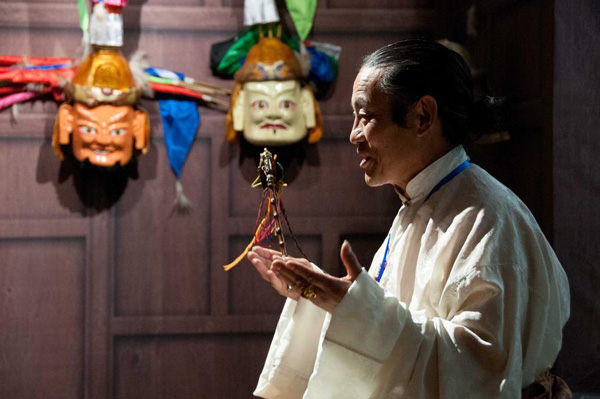 |
|
A storyteller in Sichuan province performs the King Gesar in the traditional way. [Photo/Xinhua] |
The story of "King Gesar," a warrior with boundless supernatural powers, has for centuries been preserved by the singers and storytellers that live on the roof of the world.
Now the ancient Tibetan hero of the Gesar epic tradition, which is inscribed on the UNESCO list of world intangible cultural heritage, finds himself in another realm: the Internet.
Han storyteller Zhang Zhun worked with Tibetologist Gyanpian Gyamco to produce a 40-episode podcast in Mandarin based on the vast oral narrative.
The episodes are performed in the "pingshu" style, which features literary and performance devices such as the use of a poem or rhyme to begin each story, the striking of a gavel to get the audience's attention and the use of suspense, by way of a cliff hanger, to end each chapter.
Since "King Gesar" first aired in mid-December on Litchi FM, a podcast platform, the first 10 episodes have been listened to over 40,000 times.
The Gesar legend has been traced back as far as the 12th century, and, due to the inherent flexibility of oral storytelling, the narrative is so vast that many different chapters and versions exist. Recurring, popular motifs are that Gesar was sent by the gods to vanquish monsters, end wars and unify tribes in Ling, a kingdom on the Tibet plateau.
Zhang's pingshu version of "King Gesar" is part of the non-profit program Ears for Epics, which aims to preserve and promote traditional storytelling. Ears for Epics is the brainchild of the Reading China Salon under the Chinese Culture Translations and Studies Support, Beijing Dongcheng District Library and Litchi.
The choice to perform the epic in pingshu will not only help Mandarin speakers understand the Tibetan story, but it could also help to popularize pingshu.
The 1,000 year old pingshu style witnessed a revival in the 1970s and 1980s, when radios became widely available. With the advent of new entertainment alternatives since the 1990s, however, its popularity has waned.
Zhang is no stranger to re-imagining works in the pingshu style, having won acclaim for an adaption of the Japanese cartoon series "One Piece," which he produced two years ago.